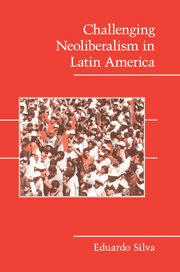Book contents
- Frontmatter
- Contents
- List of Tables
- Preface and Acknowledgments
- List of Acronyms
- 1 THE INCONVENIENT FACT OF ANTI-NEOLIBERAL MASS MOBILIZATION
- 2 CONTENTIOUS POLITICS, CONTEMPORARY MARKET SOCIETY, AND POWER
- 3 THE ARGUMENT: EXPLAINING EPISODES OF ANTI-NEOLIBERAL CONTENTION IN LATIN AMERICA
- 4 ARGENTINA
- 5 BOLIVIA
- 6 ECUADOR
- 7 VENEZUELA
- 8 PERU AND CHILE
- 9 CONCLUSION
- References
- Index
8 - PERU AND CHILE
Published online by Cambridge University Press: 05 June 2012
- Frontmatter
- Contents
- List of Tables
- Preface and Acknowledgments
- List of Acronyms
- 1 THE INCONVENIENT FACT OF ANTI-NEOLIBERAL MASS MOBILIZATION
- 2 CONTENTIOUS POLITICS, CONTEMPORARY MARKET SOCIETY, AND POWER
- 3 THE ARGUMENT: EXPLAINING EPISODES OF ANTI-NEOLIBERAL CONTENTION IN LATIN AMERICA
- 4 ARGENTINA
- 5 BOLIVIA
- 6 ECUADOR
- 7 VENEZUELA
- 8 PERU AND CHILE
- 9 CONCLUSION
- References
- Index
Summary
If efforts to construct contemporary market society in Argentina, Bolivia, Ecuador, and Venezuela contributed to Polanyian backlashes in the form of nationwide episodes of anti-neoliberal contention between 1989 and 2003, why did these not occur in Peru and Chile during the same period? In Peru, Alberto Fujimori aggressively implemented a cohesive neoliberal reform program between 1990 and 2000. Much like Carlos Menem and Carlos Andrés Pérez, he too ran a populist presidential campaign and “betrayed” his electoral mandate by turning to Washington Consensus prescriptions. Yet mobilization during this period was practically at an all-time low. Meanwhile, Chile was the original market society experiment. At the head of a ruthless labor repressive military dictatorship, General Augusto Pinochet (1973–89) stabilized the economy, privatized, deregulated, and liberalized financial and trade regimes to an extent never seen in South America. After redemocratization in 1990, successive administrations of a political party coalition that had opposed the dictatorship consolidated the dictatorship's neoliberal model and democracy under conditions of popular sector quiescence.
The puzzle runs deeper because of Peru's similarities to Bolivia and Ecuador and of Chile to Argentina. Like Ecuador and Bolivia, Peru lies in the central Andes and has a significant indigenous population. It too was late in developing national populism and, as in Ecuador, an inclusionary corporatist military government implemented it to overcome social tensions generated in a democratic regime dominated by traditional commercial and landowning elites. Moreover, as in the rest of the central Andes, Peru's political party system was weak and fragmented.
- Type
- Chapter
- Information
- Challenging Neoliberalism in Latin America , pp. 230 - 265Publisher: Cambridge University PressPrint publication year: 2009

